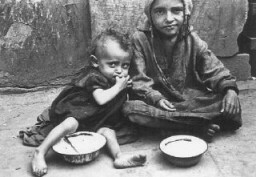You searched for: warsaw
<< Previous | Displaying results 131-140 of 487 for "warsaw" | Next >>
-
Lucine Horn describes obtaining false papers to assume the identity of an "Aryan" outside the Warsaw ghetto
Oral HistoryLucine was born to a Jewish family in Lublin. Her father was a court interpreter and her mother was a dentist. War began with the German invasion of Poland on September 1, 1939. Lucine's home was raided by German forces shortly thereafter. Soon after the German occupation of Lublin, Jews there were forced to wear a compulsory badge identifying them as Jews. A ghetto in Lublin was closed off in January 1942. Lucine survived a series of killing campaigns and deportations from the ghetto during March and…
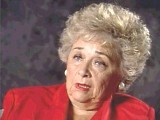
-
Julien Bryan films an anti-Nazi poster in Warsaw, 1939
PhotoJulien Bryan was an important US documentary filmmaker and photographer who captured the everyday life, work, and culture of individuals and communities in many countries around the globe. Bryan was filming in western Europe in the summer of 1939. In the first week of September 1939, Bryan made his way to Warsaw just as all foreign reporters, diplomats, and Polish government officials were fleeing the capital in the wake of the German invasion. One of the few foreign photographers left in the city, he…
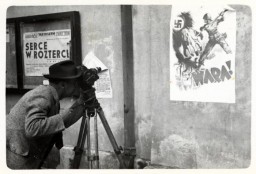
-
Vladka (Fagele) Peltel Meed describes the deportation of her mother and brother from the Warsaw ghetto to Treblinka
Oral HistoryVladka belonged to the Zukunft youth movement of the Bund (the Jewish Socialist party). She was active in the Warsaw ghetto underground as a member of the Jewish Fighting Organization (ZOB). In December 1942, she was smuggled out to the Aryan, Polish side of Warsaw to try to obtain arms and to find hiding places for children and adults. She became an active courier for the Jewish underground and for Jews in camps, forests, and other ghettos.
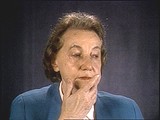
-
Meri Nowogrodzki describes fleeing from Warsaw to Vilna in December 1939
Oral HistoryMeri and her family lived in Warsaw at the time of the German invasion of Poland. After the invasion, Meri's father fled to Vilna. She joined him there in December 1939. After the Soviet occupation of Lithuania in 1940, Meri's father obtained transit visas through Japan for himself and Meri. He left for Japan first, using a false identity, and arrived there in February 1941. Meri soon followed him. In Japan, Meri and her father obtained visas to enter the United States. American relief organizations…
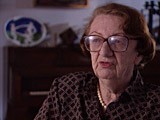
-
Abraham Lewent describes performing forced labor in Warsaw and increased Polish antisemitism
Oral HistoryLike other Jews, the Lewents were confined to the Warsaw ghetto. In 1942, as Abraham hid in a crawl space, the Germans seized his mother and sisters in a raid. They perished. He was deployed for forced labor nearby, but escaped to return to his father in the ghetto. In 1943, the two were deported to Majdanek, where Abraham's father died. Abraham later was sent to Skarzysko, Buchenwald, Schlieben, Bisingen, and Dachau. US troops liberated Abraham as the Germans evacuated prisoners.
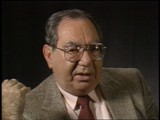
-
Yonia Fain describes leaving Warsaw after the German invasion of Poland
Oral HistoryAfter World War I, Yonia's family moved to Vilna. Yonia studied painting and graduated from the Academy of Fine Arts in Vilna. When Germany invaded Poland in September 1939, Yonia was living with his wife in Warsaw. They fled to Brest-Litovsk in eastern Poland, occupied by Soviet forces in mid-September 1939. Then Yonia and his wife escaped to Vilna. After the Soviets occupied Vilna in June 1940, Yonia and his wife forged Japanese transit visas and left for Japan. In Japan, they were unable to obtain valid…
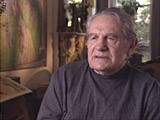
-
Susan Bluman describes leaving her family in Warsaw after the outbreak of war
Oral HistorySusan was 19 years old when Germany invaded Poland in September 1939. Her boyfriend, Nathan, was in Lvov when the Soviet Union occupied eastern Poland. Nathan sent a guide to Warsaw to bring Susan to the Soviet zone of occupied Poland. Her parents reluctantly agreed after Susan promised to return to Warsaw within two weeks. Upon her arrival in Lvov, Susan married Nathan. The couple then fled across the Lithuanian border to Vilna, where they stayed for a year. They received a visa for transit through Japan…
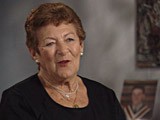
-
Fela Warschau describes reading lists of names to find surviving family members
Oral HistoryFela was liberated at Bergen-Belsen by the British army in 1945. She went to a displaced persons (DP) camp administered by the Americans in Feldafing, near Munich. She married in the DP camp in 1946, and eventually immigrated to the United States.
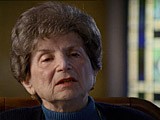
-
Fela Warschau describes liberation by British forces at Bergen-Belsen
Oral HistoryFela was liberated at Bergen-Belsen by the British army in 1945. She went to a displaced persons (DP) camp administered by the Americans in Feldafing, near Munich. She married in the DP camp in 1946, and eventually immigrated to the United States.
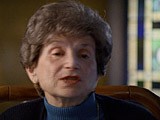
-
Hunger in the ghetto
PhotoChildren eating in a Warsaw ghetto street. Warsaw, Poland, between 1940 and 1943.
